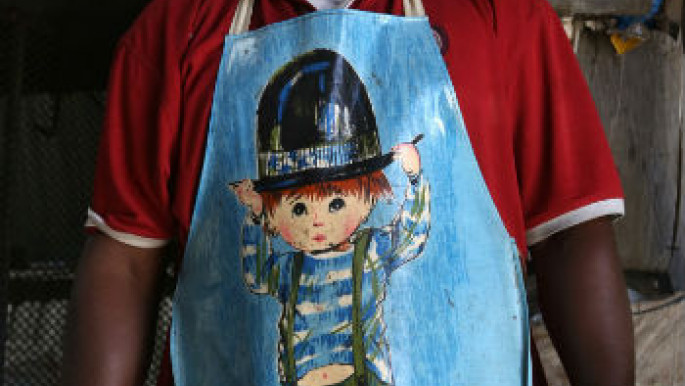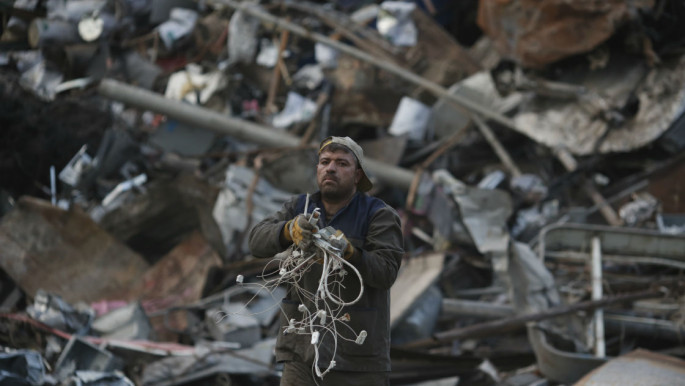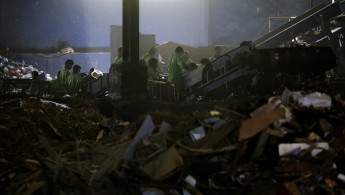Recycling in Beirut falls to activists and refugees
During Lebanon's recent garbage crisis, several non-profit organisations, activists, and civil society groups said that comprehensive recycling programs should be a key part of any solution.
Since then, businesses and NGOs in the Greater Beirut area have stepped up to the task of collecting, cleaning, and sorting recycling. There is a commonly touted belief that the city recycles eight percent of its garbage - a statistic that comes from research done by SWEEP-Net, a think-tank that focuses on solid waste management in the Middle East/North Africa.
However, a close reading of the study shows that the actual percentage of trash recycled in Beirut and the Mount Lebanon area could be significantly lower than the country's average.
According to SWEEP-Net, Lebanon was projected to produce approximately 2.25 million tons of refuse in 2015. Of this, an estimated 38 percent (855,000 tons) is recyclable, but only 180,000 tons was actually recycled. Greater Beirut and Mount Lebanon Governorates represent roughly half the population, and produce slightly more than half the garbage.
In other words, these two governorates produce more than 428,000 tons of recyclable materials per year. To keep up with national averages, at least 90,000 tons would need to be recycled. Many actors - from small businesses and environmental non-profits to giant Sukleen to semi-legal scavenge operations - have a hand in sorting Beirut's trash.
 |
|
| Refugees from as far as Ghana help sort the waste at some facilities in Beirut [AFP] |
In this chaotic system, there little clarity or accountability. But some actors are doing a better job of holding themselves accountable than others.
Several small organisations operating in and around Beirut - including Arc en Ciel, Recycle Beirut, L'Ecoute, and the Zero Waste Act - are working with schools, offices and local residents.
For a fee of $10–16 per pick-up, they collect recyclables, sort and clean them, and sell off batches to recycling treatment plants. For day-to-day operations, these organisations use the same model - most of their operational costs are covered by the pick-up fees, with the rest by grant funding.
The resale of recyclables covers only a small percentage of costs, as treatment plants pay between $50 and $200 per ton, depending on the material. At present, these groups are working on a small scale, providing services for a few hundred to a thousand clients each. All agree, the resale of recyclables will never make ends meet, and there is minimal public money available to support sustainable recycling programmes.
Where these groups differ, however, is on their long-term vision for recycling programmes in Lebanon.
Sam Kazak, cofounder of Recycle Beirut, says he attended protests organised by You Stink during the summer of 2015, but that he's lost confidence in any political fix for the broken waste management system.
"People don't trust the government, but they want the government to find a solution," he tells The New Arab. Running a recycling plant as a social business chips away at the mountains of trash and provides a living wage for his 17 employees, some of whom are Syrian refugees.
The less politics is involved, the better, says Kazak.
NGOs, on the other hand, see their work as a form of political advocacy. Cynthia Khawly, who works with Arc en Ciel, says their programme is just a stepping stone to a community-based system, countrywide. In addition to recycling for homes and businesses, Arc en Ciel works with 80 municipal governments, as a contractor either for transporting and cleaning their recyclables, or for helping towns build their own sorting centres.
To assist municipalities in becoming responsible for their own recycling, Khawly wants to see a law put in place that would compel local governments to meet recycling quotas.
The idea is based on Arc en Ciel's previous legislative success in forcing hospitals to properly sterilise medical waste. Khawly noted that the system only worked because Arc en Ciel had first created a facility that could handle medical waste treatment.
It seems that even if the government could pass the desired legislation, the work of making sure it was implemented and enforced could still fall on the shoulders of private and non-governmental actors.
| Article continues below |
 |
| Anything with resale value is salvaged from the mountains of trash [Corbis for Getty] |
With limited cooperation from municipal governments, NGOs and smaller contractors face substantial constraints on how much they can actually recycle. Since their business and residential programmes are opt-in, they can only hope that more clients will want to take advantage. Additionally, these organisations note that their clients come almost entirely from middle- and upper-class neighbourhoods in Beirut.
In urban areas, where hundreds of thousands of people are struggling to come up with a few hundred dollars each month just to pay rent, a $10 pick-up fee for recycling is possible for only a very limited number of people.
These smaller groups are offering options that are filling the holes in Lebanon's centralised waste management system. But they can only process approximately 1,000 tons of recyclables per month. That's 12,000 tons annually, although the amount may vary, as the intake of each organisation fluctuates from month to month.
As a percentage of what could be recycled in Lebanon, this barely scratches the surface.
Sukleen, the giant contractor whose waste-management contracts cover almost all Greater Beirut, ought to be responsible for the majority of the country's recycling. Yet any actual details on how much waste they process remains vague, and SWEEP-net sources suggest they might not recycle any of their waste whatsoever.
Sukleen purports to offer free recycling pick-ups to homes and businesses wishing to participate in recycling, through its "Red and Blue" programme. However, the process is irregular enough that more and more homes and businesses are opting to pay $10 pickups rather than deal with Sukleen.
The number of private pick-ups per month is also unknown. When interviewed, multiple representatives from Sukleen insisted that any information regarding the number of clients, or the areas of Beirut in which they were concentrated, was confidential. Haytan Kibeh, business manager at Sukleen's recycling department, insisted that he was "not authorized" to disclose the amount in tons of recycling that Sukleen collected through its pick-up programme.
Private pick-ups aren't the only recycling option that Sukleen prides itself on. The company also operates public recycling boxes. Again, however, the Sukleen representative refused to answer questions about how many of these boxes were placed in Beirut, where they were located, or the amount of recyclables they collect.
Sukleen might do better at facilitating the work of scavengers than it does with its own recycling. At one massive burning and dumping site in Burj Hammoud, a suburb of Beirut, Sukleen employees can be seen sweeping trash from the street into the dump piles that tower almost two stories in the air. On the other side of the trash barrier, a group of Syrian and Egyptian immigrants sort the trash for salvageable materials.
Scavenging operations can be as simple as a child searching through trash at the side of the road or as complex as this one. While the workers didn't want to risk their employment or immigration status by answering too many questions, they did provide a few answers.
Trash is dumped at the site almost every day, and a handful of workers live in an abandoned house next to the dump to work as full-time sorters. Their employer picks up the recyclables once a week, and a quick scan of the area showed massive heaps of sorted recyclables. Between one and five tons of plastic, metal, glass, and cardboard are salvaged every week.
Whatever comes out of the dump that doesn't have resale value is burned to make room for incoming garbage.
Though dozens of scavenge sites operate across the metropolitan area, the likelihood that they would process and produce 80,000 tons of recyclables recycling per year, bringing Beirut to the eight percent recycling threshold, is quite low.
While such operations publish no exact record of how much they sort and sell, the quantities viewed at any given site, as well as the physical space taken up by the operation were comparable to those collected at any small business or NGO site. Due to the semi-legal nature of the sites, there is also no public record of how many exist or where they are located.
Under such circumstances, it's almost impossible to ascertain the amounts of recyclables that scavenge operations move in a month, and due to their limited resources, they remain the least efficient method for trash sorting.
With NGOs and small businesses covering only a small amount of Greater Beirut and Mount Lebanon's waste, and virtually no accountability of large-scale contractors or scavenging operations, verifying the numbers on how much waste ends up being recycled is close to impossible.
Furthermore, as SWEEP-Net itself notes, with rapid population growth, largely due to incoming refugees, waste management is going to get more and more irregular.
One thing is certain: More and more people in Greater Beirut are waking up to the necessity of comprehensive recycling programmes. Small-scale recycling programmes are seeing more members sign up every week, and a handful of municipalities are working on building their own recycling programs.
Meeting the low benchmark of eight percent recycling may be possible even yet.



